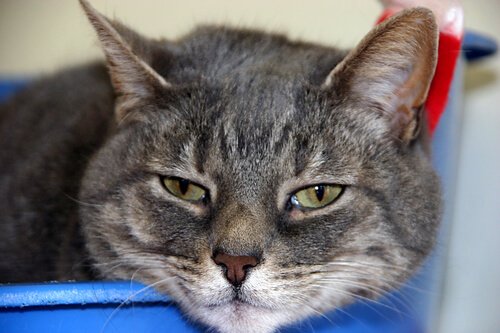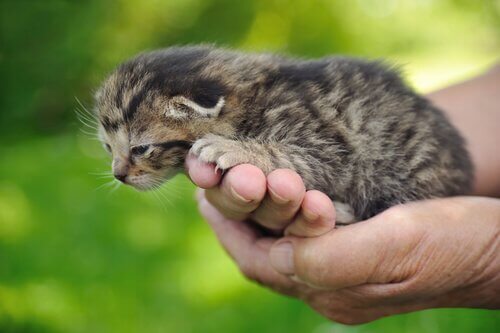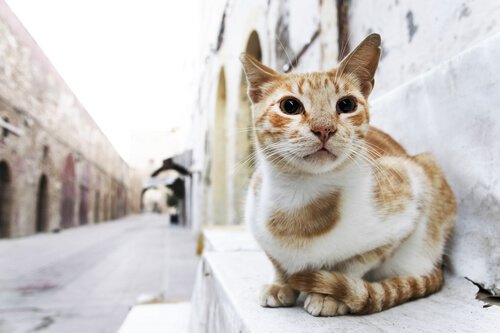Learn About These 9 Common Feline Illnesses

The list of feline illnesses that a cat can get during their lifetime is a long one. That’s why it’s so important to take good care of your cat. This means providing a good diet and getting her check-ups. Keeping up with vaccinations is also important. Read on and we’ll discuss details about some of the most common diseases in cats.
What are some of the most common feline illnesses?
1. Allergies

Allergies in kittens can cause respiratory symptoms, such as coughing, sneezing, difficulties in breathing, or skin problems. In this last case, the little one will feel intense itching. Because of this, she will lick and scratch constantly and will even pull out some of her fur. In order to treat this problem, you should first identify the allergy.
2. Feline Rhinotracheitis
Known as “cat flu”, this is one of the most frequent respiratory feline illnesses. It tends to be dangerous in unvaccinated kittens. Equally, animals that received the vaccine can suffer from a severe form of this disease. Kittens with this disease will have runny eyes, a cough, sneezing, nasal congestion and a large quantity of mucus.
3. Otitis
Inflammation in the ear canal of cats is often painful. It has serious consequences if not treated on time. Among the causes are parasites, certain fungi, and bacteria.
4. Feline Urological Syndrome
The major problem with this disease is the formation of small crystals composed of calcium and magnesium in the bladder. Consequently, these can block the urethra causing a critical condition.
Due to anatomical characteristics, the obstruction of the urethra is more common and more serious in males. The main signs that a cat is affected by Feline Urological Syndrome are the following:
- Frequent licking of the urinary area
- Excessive thirst
- Urinating in unusual places
- Difficulty and pain when urinating
When the urinary tract is blocked, the pain increases and causes vomiting.
5. Poor kidney functioning
This is a very common condition, especially in older cats. It consists of the inability of the kidneys to eliminate toxins and other waste products from the blood. As a result, this produces signs of uremic poisoning. Insufficient renal functioning can present itself in an acute manner. Also, it can gradually manifest itself over weeks and months.
A kitten with kidney problems will lose its appetite and become thin. In addition, she will also drink more water and urinate more.
6. Hypertrophic Cardiomyopathy
Of all the common illnesses in cats, hypertrophic cardiomyopathy is the most frequent form of cardiac disease. This ailment is thought to be hereditary. It causes an enlargement of the myocardial mass of the left ventricle. Consequently, the volume is reduced in the cardiac chamber. The amount of blood that it pumps is also reduced.
These subtle signs tend to show themselves. So, you should pay attention to the following:
- Weight loss
- Respiratory problems
- Signs of fatigue and disinterest
7. Feline Panleukopenia
This is a virus which is highly contagious caused by feline parvovirus. In fact, it’s provoked by inflammation of the intestinal mucous. A cat infected with this can present the following symptoms:
- Lack of appetite
- Fever
- Foamy vomiting
- Runny feces (yellow and greasy) or bloody feces (dark with a bad odor)
- Abdominal pain
- Presence of leucocytes in the blood
8. Feline Leukemia

Leukemia is one of the common feline illnesses that cats get by direct contact with other infected cats. The gestation period for this disease is very long. It may even last for years until symptoms are present.
This is a retrovirus that incorporates genetic materials from the cells. Because of this, it’s very difficult to treat. Moreover, treatment may provoke various illnesses and complications. For example:
- Leukemia
- Liver problems
- Anemia
- Leucopenia
- Miscarriages
9. Feline Immunodeficiency (HIV)
Also known as feline AIDS, HIV affects the immune system, causing a progressive deterioration of our defences. As a result, the cat risks getting infections and illnesses from viruses, bacteria, fungi or parasites. Usually, the most direct way to contract the virus is through a bite from another animal.
All cited sources were thoroughly reviewed by our team to ensure their quality, reliability, currency, and validity. The bibliography of this article was considered reliable and of academic or scientific accuracy.
- Gore, T. C., Lakshmanan, N., Williams, J. R., Jirjis, F. F., Chester, S. T., Duncan, K. L., … Sterner, F. J. (2006). Three-year duration of immunity in cats following vaccination against feline rhinotracheitis virus, feline calicivirus, and feline panleukopenia virus. Veterinary Therapeutics : Research in Applied Veterinary Medicine.
-
Kruse, B. D., Unterer, S., Horlacher, K., Sauter-Louis, C., & Hartmann, K. (2010). Prognostic Factors in Cats with Feline Panleukopenia. Journal of Veterinary Internal Medicine. https://doi.org/10.1111/j.1939-1676.2010.0604.x